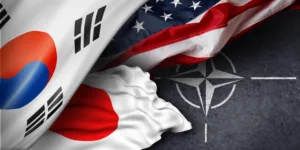Welcome to the 67th issue of the CEEasia Briefing.
In this issue, we dissect the following topics:
- EU–China summit
- Relations between Czechia and Japan
- DeepSeek ban
If you like what you see, please forward this message to your friends and colleagues who can subscribe here.
Do you need to know more about East Asia? Don’t hesitate to shoot us a message about custom analysis tailored to your needs.
1. EU-China summit
What’s going on? On 24 July 2025, the EU and China held their 25th summit in Beijing. Despite marking the 50th anniversary of diplomatic ties, the meeting delivered minimal results, with only modest progress on climate cooperation and rare earth trade.
Going deeper… The summit highlighted the deepening divide in EU-China relations. European Commission President Ursula von der Leyen described the economic relationship as being at an “inflection point.” The EU officials expressed concerns about trade imbalances, limited market access, China’s industrial overcapacity, and market-distorting practices. China pushed back, urging continued cooperation while criticizing the EU’s de-risking strategy.
What’s the geopolitical angle? A key sticking point remains China’s close ties with Russia. Von der Leyen called this a “determining factor” for future relations, while China insisted the war in Ukraine is not a bilateral issue. Tensions around this issue show no sign of easing. Already before the summit, reports emerged that Chinese Foreign Minister Wang Yi told the EU that China couldn’t accept a Russian defeat in Ukraine — contradicting Beijing’s official neutrality. Soon after, the EU imposed sanctions on two Chinese banks for supporting Russia.
At the end of the day… The two sides managed to conclude the summit at least with a joint statement on climate, committing to deepen cooperation on the green transition. Furthermore, Brussels and Beijing agreed on an “upgraded export supply mechanism” to fast-track licencing for rare earth export, on which China has recently raised export controls.
What does this mean? The summit confirmed expectations of limited progress. While there were symbolic outcomes on climate and trade, no major breakthroughs occurred. Instead, trade disputes and diverging stances on Russia are pushing EU-China relations further toward strategic rivalry rather than renewed partnership.
2. Momentum in Czech-Japanese relations
What’s going on? Czech President Petr Pavel paid a working visit to Japan in July, accompanied by a business delegation. During his stay, he visited symbolic landmarks, participated in major events, and held talks with Japan’s top officials.
Going deeper… From July 22–26, President Pavel visited Himeji, Hiroshima, Osaka, and Tokyo, accompanied by a high-level business delegation. In Himeji, a cooperation memorandum between Prague Castle and Himeji Castle, both UNESCO World Heritage Sites, symbolized cultural diplomacy. In Hiroshima, the President honored the victims of the atomic bombing at the Peace Memorial and visited the Atomic Bomb Dome, originally designed by Czech architect Jan Letzel, considered as a touching gesture emphasizing shared historical memory.
On July 24, Czechia celebrated its National Day at Expo 2025 in Osaka, with President Pavel and Princess Takamado attending a showcase of Czech culture, science, and innovation. The following day in Tokyo, Pavel opened the Czech–Japanese Business Resilience Forum and met both Prime Minister Shigeru Ishiba and Emperor Naruhito, discussing cooperation in security, energy, and high technology. He also delivered a public lecture at the University of Tokyo on Indo-Pacific–Europe security dynamics.
Moreover… Just one day after his return from Japan, President Pavel met the Dalai Lama in India, becoming the first Czech president to do so in office. The visit was a continuation of Václav Havel’s focus on democratic values and human rights. China’s Ministry of Foreign Affairs and its embassy in the Czech Republic issued a statement saying they “resolutely opposed” the meeting between President Pavel and the Tibetan spiritual leader. The statement urged the Czech Republic to “abide by its one-China policy” and avoid actions that could harm China–Czech relations. However, as our polling shows, Czechs hold the most negative views of China among the V4 countries.
This means… President Petr Pavel’s July visit to Japan gave new momentum to Czech–Japanese relations, combining symbolic gestures, cultural diplomacy, and high-level talks on economic and strategic cooperation. The trip, followed by his meeting with the Dalai Lama, also reaffirmed his commitment to Havel’s legacy foreign policy based on values in the current changing world order. Japan is emerging as a stable, like-minded partner for not only the Czech Republic. This was confirmed at the 30th EU–Japan Summit in Tokyo in July, where European and Japanese leaders launched a Competitiveness Alliance and reaffirmed their shared commitment to economic security, multilateralism, and a free Indo-Pacific.
3. DeepSeek ban
What’s going on? The Czech government has banned the use of all products from the Chinese company DeepSeek within the state administration after a recommendation from the National Cyber and Information Security Agency (NÚKIB) due to security risks. The Czech Prime Minister Petr Fiala stated that the data is stored on servers in China and Russia, which could lead to unauthorised access to user information.
Going deeper… Czechia has joined a growing number of countries that have banned the use of DeepSeek. Similar restrictions are already in place in several other states, including Australia, where the app is prohibited across all government systems. Within the EU, Dutch authorities have barred civil servants from using DeepSeek due to espionage concerns, while the Slovak National Security Authority has issued a public warning back in January. In the US, various federal institutions—such as the US Congress, the Pentagon, the US Navy, and NASA—as well as multiple state governments, including Texas and New York, have enacted similar bans.
This means… The Czech ban on DeepSeek is not an isolated decision but part of a broader trend of growing distrust toward Chinese technologies across the Western world. The response from Western governments underscores that access to data and transparency in AI systems are increasingly seen as matters of strategic importance. The move against DeepSeek highlights a deeper shift: artificial intelligence is no longer perceived solely as a technological tool, but as a potential political and security threat.
Moreover… The trend of banning Chinese technologies across democratic states points to an emerging technological decoupling between China and the West. This could lead to diverging trajectories in the development of AI itself—one guided by democratic norms, openness, and accountability, and the other by centralized state control, opaque standards, and surveillance-driven priorities.
Quick takes on CEEasia developments
CHINA | The European Parliament adopted a resolution condemning China’s export restrictions on critical raw materials on July 9th. The resolution considers such measures to be an unjustified weaponisation and calls for strengthening of coordination on the issue with partners such as NATO and G7, including sourcing the materials from EU suppliers and trusted allies.
CHINA | China and Hungary reached a consensus on an extradition treaty during negotiations in Budapest in mid-July. The treaty is now awaiting signing, ratification, and entry into force.
CHINA | The European Commission on 14 July imposed anti-dumping duties of 21.3% to 36.1 % on multilayered wood flooring from China, following an investigation showing such imports were harming EU industry.
INDONESIA | EU chief Ursula von der Leyen and Indonesian President Prabowo Subianto announced a ‘political agreement’ after their meeting in mid-July to conclude a long-negotiated free trade deal by September. Brussels and Jakarta have been negotiating the FTA since 2016.
VIETNAM | Czech Minister of Industry and Trade Lukas Vlcek visited Vietnam in July to explore cooperation in technology, energy, mining, and the defence industries. A business networking seminar was organised as a part of the visit, drawing nearly 100 representatives from government agencies, trade promotion bodies, and businesses.









